Deeper Learning Through a Global Lens Transcript
+++ 00:00:05 +++
Card:
Deeper Learning
Elevating Student Thinking and Student Voice
Card:
Deeper Learning Competencies
•Master core academic content
•Think critically and solve complex problems
•Work collaboratively
•Communicate effectively
•Learn how to learn
•Develop academic mindsets
Teacher: Practice without using any English whatsoever.
Jade:
Student:
Jade:
Student:
+++ 00:00:36 +++
Brandon Wiley: Students, when they're engaged in project-based learning, and relevant global issues, are doing all the things that we want students to do to demonstrate deeper learning.
Brady Efting: How does understanding perspectives of others, how will that benefit you in life? Yes?
Student: Even if something seems really weird to someone doesn't mean that it is weird.
Student: Everyone would be boring if we were all the same.
Brady Efting: The world is getting smaller, and the kids, for instance they don't have the skills to maneuver and operate in the world, they're going to get left behind.
Teacher: Right?
+++ 00:01:06 +++
Gerardo Munoz: The idea is that they learn a lot of the same things that they would learn in a regular school, except it all has an international bent to it.
Dr. Susan Marion: The claim is about what? The human condition, human nature, or human potential.
Student: It was clearly about powerful women.
Brandon Wiley: We're trying to make learning relevant in a global world, preparing kids for a global society, but all the while learning about themselves as a learner.
Card:
Deeper Learning Through a Global Lens
featured organization
Asia Society
Card:
Denver Center for International Studies
Denver, Colorado
Teacher:
Student:
Teacher:
Lower Third:
Executive Director, ISSN
Asia Society
+++ 00:01:46 +++
Brandon Wiley: Every aspect of this school really focuses on global competence and deeper learning.
Students on Skype:
Brandon Wiley: It's important for us to create global citizens, because of the world in which they're going to live. Increasingly the jobs that they're going to have, the people that they're going to be dealing with, they're going to come from different cultures and different backgrounds, for them to be able to collaborate, for them to communicate effectively, it's important that they understand the different perspectives and the backgrounds that people bring with them to the table.
Lower Third:
Gerardo Munoz
10th Grade Social Studies Teacher
Denver Center for International Studies
+++ 00:02:15 +++
Gerardo Munoz: We're an International Studies Magnet School that serves grades six through twelve. The idea is that they learn a lot of the same things they would learn in a regular school, except it all has an international bent to it. What we hope is that our students will develop this hunger for going out to the rest of the world, and they do that via language, they do that via cultural studies, social action classes that we offer, and create a role for themselves to engage with the rest of the world.
Card:
6th Grade Social Studies
+++ 00:02:44 +++
Brady Efting: Okay, ladies and gentlemen, please grab your seats. Here's your focus activity, and it is simply from this picture, three things you notice, two things you wonder. It's a question like what do you think they're doing in the picture, like why are they doing this action?
Lower Third:
6th Grade Social Studies Teacher
Denver Center for International Studies
Brady Efting: In this class, we really focus on is investigating the world. The kids love the idea of studying cultures and just seeing pictures, images and discussing things. And why is it important to understand other cultures? And then when you are studying cultures and seeing cultures, to understand their perspectives and their points of view.
Student: And it was just like culture religion.
+++ 00:03:14 +++
Brady Efting: So you feel this could be some sort of religious practice that's going on.
Student: Yes!
Student: I think that they're having a twist on a staring contest. So it's like this.
Student: I'm pretty sure it's an arranged marriage.
Brady Efting: You're pretty-- you're like, this is definitely an arranged marriage.
Student: Yeah, because the girl does not want to do it, and the boy's like, "Yes!"
Student: I guess it's probably a greeting like to say, "Hello."
Card:
Hongi
•The Maori form of greeting is called 'hongi', which is the pressing of noses. It is a tradition which continues today at major ceremonial functions.
+++ 00:03:35 +++
Brady Efting: Ooh, it could be! So what this is, it's called the Hongi. It is a traditional form of greeting in the Maori culture. It's the pressing of noses. It is a tradition which continues today at major ceremonial functions. So some people referenced to ceremonies.
Student: It looks like she was scared.
Brady Efting: Right now, if you so choose, you can get up and go greet a friend or two with a traditional...
Brady Efting: The world is getting smaller, and if the kids, if they don't have the skills to maneuver and operate in the world, they're going to get left behind. And by teaching global competencies, you really hit on everything that the kids need to successfully maneuver.
+++ 00:04:12 +++
Brady Efting: This whole unit this morning seems kind of silly. Like you got to go up and greet somebody by your presses your noses on them. We had a good conversation. But it's all about perspective. How does understanding perspectives of others, how will that benefit you in life? Like what is the value of understanding others? Yes?
Student: Even if something seems really weird to someone doesn't mean that it is weird for some people, and if you think it is, then you're probably missing out on something really cool and interesting.
Student: Sometimes you may think that ethnocentrism, because you may think that you're cultural is like higher than theirs.
Brady Efting: And you're not opening up to them.
Student: Yeah.
Brady Efting: So you kind of have an ethnocentric-- right? One of the word walls, ethnocentric view on them. Very good. Yeah?
+++ 00:04:48 +++
Student: Everyone would be boring if we were all the same.
Brady Efting: We had an amazing discussion about perspective and the importance of perspective, and how it benefits them. These kids really got like how important it is to kind of analyze a situation, and try to see the whole picture, and to maneuver through the world.
Brady Efting: Very, very good answers. Now.
Brandon Wiley: This idea of investigating the world, of recognizing perspectives, and communicating ideas all directly relate to the common core.
Card:
11th/12th Grade AP Language
+++ 00:08:20 +++
Dr. Susan Marion: What you're going to want to do today as your montage is being presented is to elicit as much feedback as possible from your peers.
Student: This class is AP Language, and the whole class is kind of focused on creating different arguments and learning how to use them to our full advantage.
Dr. Susan Marion: The claim is about what? The human condition, human nature, or human potential.
Lower Third:
Dr. Susan Marion
English Language Arts Teacher
Denver Center for International Studies
+++ 00:05:42 +++
Dr. Susan Marion: I think the deeper and broader that these students can think, and the more access they have to a bigger planet, that brings so much more to their decision-making, to their understanding of really the complex dynamics of issues that they'll face. So I think they're better prepared to really be active in the global arena.
Brandon Wiley: We're investigating issues that are important to the world. Students were creating video montages. And in that case, they had to make a claim and back up that claim with evidence.
+++ 00:06:16 +++
Student: What we're learning is how to use juxtaposition, and like placing visuals next to each other to create an argument that other people understand.
Student: It was clearly about powerful women. And at first it was kind of confusing, ’cause you think it's about equality, because they show like slavery, and then they show like these strong feminists.
Student: I think the strongest claim that I felt you guys were trying to make was that in the past women haven't had equality, and there hasn't been the strongest thing. But there are instances of powerful women, and we're always trying to work through greater things of equality.
+++ 00:06:49 +++
Student: I think that you're trying to say towards the end that there's still work to be done, I guess.
Student: Should we tell them our claim?
Student: Okay.
Student: Okay, so basically our claim is that women in the Western world have progressed rapidly in society in a really short amount of time.
Student: It's really good feedback. It's stuff to think about in the future when we do projects like this. We do stuff like this all the time in a lot of our classes. So it's really good to hear.
Student: Our whole video is for potential. That's our main goal.
Dr. Susan Marion: All right!
+++ 00:07:20 +++
Dr. Susan Marion: If students own their own learning, if they've learned deeply and thoroughly, and they own it, then they'll retain it. They won't forget it, it will matter to them, they can build on it. There's so much more they can do with it.
Card:
10th Grade Social Studies
Gerardo Munoz: The simulation we're going to do is old school, it's called BaFá BaFá. And I'm not going to tell you a whole lot about how it works. You will learn it as you go.
Gerardo Munoz: BaFá BaFá, it's a cross-cultural simulation. It was created in the '70s as a way of creating a sense of empathy for people who are outsiders to a culture.
+++ 00:07:55 +++
Gerardo Munoz: So once you're divided into your two cultures, you will go to the room that you're assigned to, and you will practice your culture. You will be taught your culture. You're going to learn a little bit about how they sort of function. And then you're going to practice being a member of that culture. These are not real cultures.
Card:
Alpha Group
Recording: You are now members of the Alpha Culture. Alpha's love to laugh, touch one another, talk--
Gerardo Munoz: They're assigned a culture, they have to learn their culture, and then they have to practice their culture as if it was their everyday business.
Recording: Continue to touch him or her during the conversation whenever there's the least possible .
+++ 00:08:26 +++
Student: We're used to like stepping back and like-- usually-- no, this is wrong.
Card:
Beta Group
Teacher: Practice without using any English whatsoever. Okay? Only the Beta language for the next couple of minutes.
Student:
Student:
Student:
+++ 00:08:48 +++
Gerardo Munoz: The important thing is how we interact with them. They're trying to interact with us, and so we want them to understand our culture and all of its values, but we're not telling them what any of those values are.
Teacher: Remember the goal is to assimilate into their culture. You want to-- you know, you don't want to offend. You want to get along with them, you want to understand what they're doing, you want to interact.
Jade:
Student:
Jade:
Student:
Jade: No.
Lower Third:
Jade
10th Grade Student
Denver Center for International Studies
+++ 00:09:11 +++
Jade: I love this school. This has changed my life in so many ways. It's empowered me to be a leader I've learned to empower other people to be a leader. I've learned how to really be globally-- a global citizen and culturally aware of other religions, cultures, and just customs in general.
Gerardo Munoz: The idea is that they've put themselves in this position, and sort of getting a taste of what it's like to be in a completely foreign culture, in a totally different culture.
Student: If you don't follow the rules, like to the letter, Jamal takes you and puts you in an isolation box. He's not trying to be a jerk. It's his rules.
+++ 00:09:45 +++
Student: Kind of like helpless in our culture, because like when they came over, they're like looking at us, like, "We need help. I don't understand the language!"
Gerardo Munoz: It forces some really interesting questions. How do we deal with notions of right or wrong, based on who we are and what we understand as being morally correct things in our culture, versus another culture who has very different values?
Student: I felt superior because I knew what was going on.
Brandon Wiley: We're trying to make learning relevant in a global world, preparing kids for a global society, but all the while learning about themselves as a learner.
+++ 00:10:17 +++
Jenna: Welcome to my Senior Presentation. First, I would like to share this quote with all of you.
Card:
Senior Presentation
Jenna: It's by Martha Graham, who's a famous dancer, and it says, "All that is important in this one moment is movement. Make the moment important, vital, and worth living. Do not let it slip away unnoticed and unused." And that's how I feel like I live life, and also how I dance. And so dance is going to be my theme for this presentation.
Brandon Wiley: The practice of having a portfolio and presenting it very publicly is a perfect opportunity for students to get ready for college and career.
+++ 00:10:48 +++
Jenna: Some of the academics and clubs that I took during this year that really were important to me were geography with Mr. Rivera [ph?], because we looked at the world, which is something that I hadn't done as much before. And it made me really excited about global issues, and I got really interested in global events.
Brandon Wiley: This process helps mold or guide them in their process of becoming self-reliant learners that know about themselves. But also base it on rigorous academics. You know, they obviously have to know their content to be able to talk about it publicly.
+++ 00:11:20 +++
Jenna: First, I'm going to talk about my Passages. And I actually was lucky enough to do two Passages as a sophomore, which is not that usual.
Lower Third:
Jenna
12 Grade Student
Denver Center for International Studies
Jenna: Passages are the most academically rigorous thing we do here. I can quite easily say that. My 15-page paper took me months to complete. I mean, we did it as a class, but still you put so much of your extra time into it both with research...
Card:
Passages form and examples
Jenna: ... and editing and writing. It takes a lot of time to complete.
+++ 00:11:50 +++
Jenna: So my first Passage was with Project Cure, which is a non-profit organization. And what started me on that was the earthquake in Haiti.
Brandon Wiley: I think what Passages do for students, a couple things. First of all, it gives them the voice that, "Hey, this is something I want to learn about. The second is, it's rigorous.
Teacher: You talked a little bit about your trip, and just this recognizing perspective. Could you talk a little bit more about what exactly changed? Like what did you learn from that experience?
+++ 00:12:19 +++
Jenna: I learned a lot about things that are not true, that in the United States we believe to be true. And it really makes me wonder about, "What else is there that is like that?"
Jenna: We have to come up with a theme for our Senior Presentations. And I thought that having a dance theme would really reflect who I am. Dance, it's the metaphor for my time here at DCIS. You know, I was really nervous coming here and that's the same way I felt about starting dance. And just as I've progressed in dance and gotten more open, and you know, gotten better at it, I feel like that's how I have been here, getting more proficient in all of my studies here.
+++ 00:13:08 +++
Brandon Wiley: Students, when they're engaged in project-based learning, and relevant global issues are doing all the things that we want students to do to demonstrate deeper learning. They're learning about themselves as learners. They're engaging with others to learn about these issues. They're having to think critically about the information that they're consuming. And also thinking about how they're going to communicate to a broader audience about their learning. We're preparing them for the world in which they will work and live.
#### End of _deeper_learning_through_a_global_lens__asia

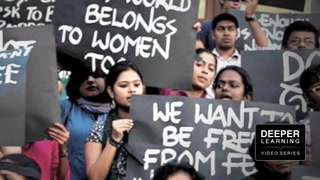
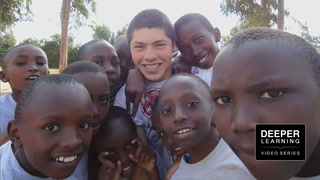
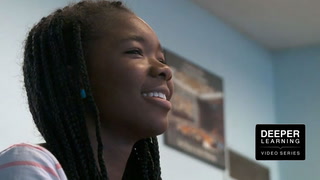
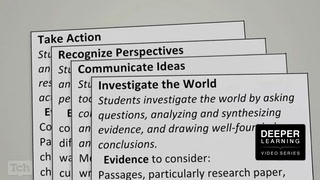
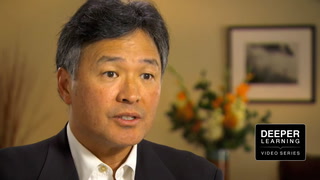








3 Comments
Jennifer Suriano Sep 30, 2020 1:22pm
I felt like there were clips on loop. Some editing where a few quotes were great...but used them two-three times.
Daneen Webster-... May 10, 2014 3:27pm
Michelle Jennings Apr 13, 2014 9:51am